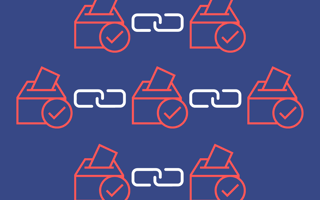
The need for remote voting options was more apparent than ever before during the last presidential election. A record number of U.S. voters chose to use alternative ballot casting methods to avoid potential exposure to Covid-19. In fact, 46 percent of U.S. voters in 2020 used mail-in ballots, according to a Census study, more than twice the amount in the 2016 election.
Mail-in ballots aren’t infallible, though. Voters who forget to update their address may not have their ballot counted or may not receive their ballot at all. That’s just one reason NYC-based nonprofit organization Tusk Philanthropies dedicates resources to developing a secure mobile voting option, which the organization hopes will come to D.C. soon.
Founded by Bradley Tusk of Tusk Holdings, Tusk Philanthropies is dedicated to solving two big issues in the U.S.: hunger and low voter turnout. To combat the latter, the organization focuses on developing mobile voting options in local and national elections. Tusk has already run 20 successful pilot mobile voting elections in seven states since 2018.
In one of those elections, voters in King County, Washington, experienced the benefits of mobile voting firsthand in February of 2020. Previously, voters in the county returned only 3,500 ballots out of 1.2 million registered voters, Tusk told Built In. When all registered voters were given the option to cast their ballot by smartphone, voter turnout doubled. King County offered mobile voting again in 2021 and the turnout increased by another 50 percent.
“It’s proof that when you increase options and make voting more convenient, more people participate,” said Jocelyn Bucaro, director of Tusk Philanthropies’ Mobile Voting Project. Unsurprisingly, King County has elected again to use mobile voting in 2022.
This method may be coming to D.C. sooner than you think. In July, D.C. councilmember Trayon White introduced a bill to allow voters to cast ballots via smartphone. Tusk supports the bill and has invested $10 million in developing new mobile voting technology with plans to bring it to D.C. within the next few years, according to Technical.ly DC.
The technology being developed by grantees of Tusk uses open-source components and end-to-end verification to encrypt and lock digital ballots in a virtual ballot box. Voters simply download an app, securely log in, fill out their ballot and the platform takes it from there.
“Instead of your ballot being sealed in a paper envelope, it’s sealed by encryption in a digital envelope with your signature affidavit form that you’ve completed, encrypted separately from your ballot, which is sealed in a sort of double envelope,” Bucaro said. “That’s then transmitted electronically to a digital ballot box, where the ballot remains encrypted while the election official verifies your signature. They’re processed in the same way traditional ballots are, just digitally.”
While in the digital ballot box, end-to-end verification and encryption ensures that the integrity of votes remain intact, since voters can verify that their ballots are cast and counted as intended. In other words, hacking ballot boxes and changing votes isn’t something voters need to be concerned about because voters can always verify their ballot online. In fact, Bucaro said digital ballots may be more secure and mistake-proof than other alternative voting methods.
Many U.S. voters serving in the military already vote by fax or email, but, in order to do so, they have to give up their right to a secret ballot. They also still have to have a printer to print out the form and then scan or fax it. With mobile voting, military service members can retain their right to a secret ballot and don’t need a printer.
While mail-in ballots are a good option for remote voting, they’re still subject to human error. Tusk’s mobile voting option offers voters the ability to check that their ballots were filled out correctly. If there’s an error, this makes it easier for voters to get in contact with elected officials to correct the mistake and make sure their ballot is counted.
“Every voting method carries risk. The question is how do we mitigate that risk whether ballots are returned in person, by mail or digitally?” Bucaro said. “Mobile voting offers the tools voters and election officials need to detect any potential threat, recover from that threat and ensure that their vote is still cast as intended.”
If the new bill from the D.C. Council passes, Tusk anticipates mobile voting technology either from its grantees or another vendor will be used in 2024, when the bill would go into effect. Bucaro has confidence the new voting method will be received well; 70 percent of D.C. voters support digital voting tools, according to a poll conducted by Hart Research in conjunction with Tusk earlier this month.




